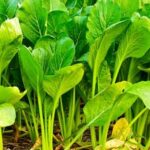Are you wondering, “Is black dyed mulch safe for vegetable gardens?” Mulch plays a vital role in the health of vegetable gardens, providing moisture retention, weed suppression, and soil insulation. However, choosing the right type of mulch is crucial. In this article, we will delve into the safety of using black dyed mulch in vegetable gardens and explore its potential impact on soil and plants.
When it comes to mulching vegetable gardens, selecting the appropriate type of mulch is essential. Black dyed mulch has gained popularity for its aesthetic appeal and ability to enhance the visual appeal of garden beds. However, there are concerns about whether the dye used in black dyed mulch can have adverse effects on the soil and vegetables.
The process of dyeing mulch involves the use of chemicals to achieve the desired color. This raises questions about the potential impact of these chemicals on the soil and plants in vegetable gardens. In the following sections, we will examine the process of dyeing mulch, discuss its chemical composition, and evaluate any potential risks associated with using black dyed mulch in vegetable gardens.
The Process of Dyeing Mulch
Black dyed mulch is a popular choice for landscaping and gardening, including use in vegetable gardens. However, it is important to understand the process of dyeing mulch and its potential impact on the soil and plants. The process of dyeing mulch typically involves the use of colorants and other additives to achieve the desired black color. These colorants can be organic or synthetic in nature, and their specific composition can vary depending on the manufacturer.
The production of black dyed mulch begins with sourcing raw wood materials, such as bark, wood chips, or sawdust, which are then processed and ground into smaller pieces. These raw materials are then mixed with the selected colorants and additives before being exposed to heat to facilitate the bonding process. The final product is then cooled, dried, and packaged for distribution.
While this process results in a visually appealing black mulch that can enhance the aesthetic appeal of a vegetable garden, there are concerns about the potential impact of dyed mulch on the soil and plants. The use of synthetic colorants and additives raises questions about their chemical composition and how they may interact with the soil ecosystem. Additionally, there is a concern that leaching of these chemicals from dyed mulch could affect the health of vegetables grown in close proximity.
To address these concerns individuals should take certain precautions when using black dyed mulch especially in vegetable gardens:
- Consider using organic or naturally colored alternatives such as wood chips or straw
- Conduct thorough research on the specific brand of black dyed mulch being considered
- Consult with gardening experts or horticulturists for recommendations on safe mulching options
Chemical Composition of Dyed Mulch
Black dyed mulch is a popular choice for landscaping and gardening, including use in vegetable gardens. However, many gardeners have concerns about the safety of using black dyed mulch in their vegetable gardens. One of the primary questions surrounding this issue is whether the chemicals used in dyeing mulch can have harmful effects on the soil and vegetables.
The process of dyeing mulch involves treating wood-based mulch with a colorant to achieve the desired color, such as black. The colorants used in this process can vary, but they often contain chemicals that raise concerns about their impact on soil and plant health.
One common chemical used in dyeing mulch is iron oxide, which is responsible for producing the black color. Iron oxide itself is not considered toxic to plants or soil, but there may be other additives or substances included in the dye that could pose risks. For example, some black dyes may contain petroleum-based components that can release potentially harmful compounds into the soil over time.
Research has shown that certain dyes and additives used in dyed mulch can leach into the soil and affect its pH level, nutrient composition, and overall health. This can have implications for the growth and development of vegetables grown in these conditions.
| Chemical Used | Potential Effects |
|---|---|
| Iron Oxide | Responsible for producing black color; not considered toxic to plants or soil |
| Petroleum-based components | Can release potentially harmful compounds into the soil over time |
Potential Risks
When considering the use of black dyed mulch in vegetable gardens, it is essential to be aware of the potential risks associated with this type of mulch. The dyeing process involves the use of various chemicals and additives that may have adverse effects on the soil and plants.
One potential risk is the leaching of these chemicals into the soil, which can then be absorbed by the vegetable plants. This can lead to contamination of the produce, posing a health risk to those consuming it.
Another concern is the impact of black dyed mulch on soil microorganisms. These microorganisms play a crucial role in maintaining soil fertility and supporting plant growth. The chemicals present in dyed mulch may disrupt the balance of beneficial microorganisms in the soil, leading to decreased nutrient availability for vegetable plants. This can ultimately affect the overall health and productivity of the garden.
Furthermore, there is also a risk of long-term environmental impact due to the use of black dyed mulch in vegetable gardens. Chemicals from dyed mulch can potentially seep into groundwater, affecting not only the immediate gardening area but also surrounding ecosystems. It is important to carefully consider these potential risks before deciding to use black dyed mulch in a vegetable garden.
Potential measures to mitigate these risks include:
- Conducting thorough research on specific products and their chemical composition before purchasing black dyed mulch.
- Utilizing barrier methods such as plastic sheeting or landscape fabric between dyed mulch and soil to minimize direct contact.
- Implementing regular soil testing to monitor any changes in chemical levels and nutrient availability over time when using black dyed mulch.
Ultimately, it is crucial for gardeners to weigh these potential risks against any perceived benefits when considering whether black dyed mulch is safe for use in their vegetable gardens.
Research Findings
Another research conducted by the USDA Agricultural Research Service discovered that some types of dyed mulch contain harmful chemicals such as formaldehyde and coal tar, which can have detrimental effects on soil microorganisms. These chemicals may disrupt the natural balance of beneficial microorganisms in the soil, impacting the overall health and productivity of vegetable gardens.
Furthermore, a study conducted by North Carolina State University Extension concluded that while most organic dyes used for coloring mulch are generally safe for use in vegetable gardens, caution should be exercised when using dyed mulch with unknown or synthetic dyes. It is crucial to understand and consider the specific composition of any dyed mulch being considered for use in a vegetable garden to ensure it will not pose a risk to soil or plant health.
While these research findings provide valuable insights into the potential risks associated with using black dyed mulch in vegetable gardens, more studies are needed to fully understand the long-term implications on soil and plant health. Gardeners should err on the side of caution when choosing mulching options for their vegetable gardens and consider alternative materials that are known to be safe for use.
Alternative Mulching Options
When considering mulching options for vegetable gardens, it is essential to prioritize the safety and health of your plants and soil. While black dyed mulch may be a popular choice for its aesthetic appeal, there are potential risks associated with its use in vegetable gardens. As an alternative, gardeners can explore other mulching options that not only provide the same benefits as dyed mulch but also promote the overall well-being of the garden.
Organic Mulch
One of the safest and most beneficial alternatives to black dyed mulch is organic mulch. This type of mulch is derived from natural materials such as straw, leaves, grass clippings, or wood chips. Organic mulches enrich the soil as they decompose, providing essential nutrients to the vegetables while improving soil structure and moisture retention. Additionally, organic mulches do not contain any harmful chemicals or dyes that could potentially leach into the soil.
Grass Clippings
For those seeking a readily available and cost-effective alternative to black dyed mulch, grass clippings can be an excellent option for vegetable gardens. Grass clippings act as a natural weed barrier while also providing nutrients to the soil as they break down. It is important to ensure that the grass clippings have not been treated with any herbicides or pesticides that could harm the vegetables.
Straw Mulch
Straw mulch is another safe and beneficial option for vegetable gardens. It helps retain moisture in the soil, suppresses weed growth, and provides insulation for plant roots during extreme temperatures. Straw also decomposes slowly, adding organic matter to the soil over time. When using straw as mulch, it is important to opt for untreated straw to avoid any potential negative effects on the vegetables.
Tips for Safe Use
Choosing the Right Type of Black Dyed Mulch
When considering using black dyed mulch in vegetable gardens, it is important to choose a product that is specifically labeled as safe for use around edible plants. Look for mulch that is made from natural, non-toxic dyes and organic materials. Avoid products that contain chemicals such as chromated copper arsenate (CCA) or creosote, as these can be harmful to both plants and soil.
Apply a Protective Layer
If you have decided to use black dyed mulch in your vegetable garden, consider applying a protective layer between the mulch and the soil. A layer of landscape fabric or biodegradable plastic can help prevent direct contact between the dyed mulch and your soil, reducing the risk of chemical leaching.
Monitor Plant Health
After applying black dyed mulch in your vegetable garden, it is essential to monitor the health of your plants regularly. Keep an eye out for any signs of stress, discoloration, or stunted growth. If you notice any negative effects on your vegetables, consider removing the dyed mulch and switching to a natural alternative.
By following these tips and guidelines for safe use, you can minimize potential risks associated with black dyed mulch in your vegetable garden. However, always remember to prioritize the health and safety of your plants when choosing any type of mulch for your garden.
Conclusion
In conclusion, the question “Is black dyed mulch safe for vegetable gardens?” is a valid concern that has been thoroughly explored in this article.
The process of dyeing mulch and the chemical composition of dyed mulch have been discussed, shedding light on the potential risks associated with using black dyed mulch in vegetable gardens. While there may be some concerns regarding the impact of dyed mulch on soil and vegetables, it is important to consider alternative mulching options that are safe and beneficial for soil and plants.
Research findings have shown that there are potential risks of using black dyed mulch in vegetable gardens, including leaching of chemicals and its impact on soil microorganisms. However, it is essential to note that more scientific studies or research need to be conducted to provide a definitive answer to the safety of black dyed mulch in vegetable gardens. In the meantime, gardeners are encouraged to explore alternative mulching options that will not pose any risks to their vegetables or soil.
In light of the potential risks associated with black dyed mulch, it is recommended for gardeners to opt for natural and organic mulching materials such as straw, grass clippings, or untreated wood chips. These alternatives not only provide effective weed control and moisture retention but also contribute positively to the overall health of the soil and vegetables.
Ultimately, while more research is needed to definitively answer whether black dyed mulch is safe for vegetable gardens, choosing natural and organic mulching options remains a prudent choice for gardeners concerned about their crops’ safety.
Frequently Asked Questions
What Color Mulch Is Best for Vegetable Garden?
The best color mulch for a vegetable garden is typically black, as it helps to retain moisture and warm the soil. It also provides a nice contrast to the green foliage of the plants.
What Are the Disadvantages of Black Mulch?
Some disadvantages of black mulch include its ability to absorb and retain heat, which can potentially lead to overheating of the soil. It may also break down faster than other types of mulch, requiring more frequent replacement.
Can You Put Black Mulch Around Tomato Plants?
Yes, you can put black mulch around tomato plants. In fact, black mulch is often recommended for tomato plants as it can help warm the soil and improve overall growing conditions. However, it’s important to monitor soil temperature to prevent overheating.

If you’re looking to get into vegetable gardening, or are just looking for some tips on how to make your current garden better, then you’ve come to the right place! My name is Ethel and I have been gardening for years. In this blog, I’m going to share with you some of my best tips on how to create a successful vegetable garden.





